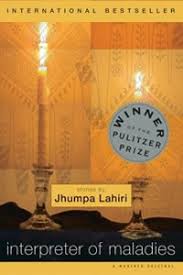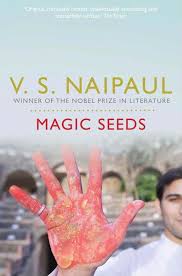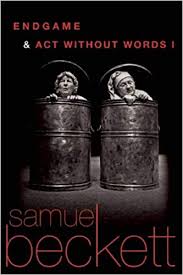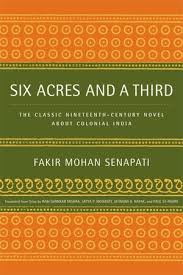VOL- 5 ; ISSUE- 4, PUNE RESEARCH - An International Journal in English (ISSN 2454-3454) JIF 3.02
5.4
Area of Article : ALL

VOL- 5 ; ISSUE- 4, PUNE RESEARCH - An International Journal in English (ISSN 2454-3454) JIF 3.02
5.4

VOL- 5 ; ISSUE- 4, PUNE RESEARCH - An International Journal in English (ISSN 2454-3454) JIF 3.02
5.4.1 ENGLISH

The paper entitled “Cultural Displacement and
Identity Conflict in Jhumpa Lahiri’s Mrs.
Sen’s and The Treatment of Bibi Haldar” explores the pain of displacement of an
immigrant, Mrs. Sen in a foreign land. She fails to adapt American life style
and prefers to lead the life of a typical Indian woman who has not changed
herself with the change of the culture and the surrounding. Keeping her culture
alive even in America, reflects how much she wants to remain connected with her
own tradition, customs and its people. In another short story The Treatment of
Bibi Haldar, Jhumpa Lahiri not only highlights
Indian traditions and cultural heritage but also the gender issues prevalent in the patriarchal society. The
chief character Bibi Haldar, a 29 year old Bengali woman wants to get married
but her hopes shatter when her cousin and his wife reject to perform her
ceremony and consider her marriage an expensive affair. The story reveals the
real picture of Indian society where a girl is supposed to be a burden on
family members whose birth is not taken as an occasion but as mourning.
Key Words:
Displacement, immigrant, culture, tradition, gender, marriage, society
VOL- 5 ; ISSUE- 4, PUNE RESEARCH - An International Journal in English (ISSN 2454-3454) JIF 3.02
5.4.2 ENGLISH

Henry Fielding was born at Sharpham Park in
the vicinity of Glastonbury in 1707.It was Sir Gould’s countryside estate. The
novelist was the eldest son of Sarah and Edmund. He passed some of his time
with Lady Gould, his grandmother. There he developed a taste for law and read
something of literature. Fielding died in October, 1754. Before that he was
gripped by gout. In 1753 his health showed a considerable deterioration. It
became exceedingly difficult for him to perform his magisterial duties. Since
the climate of England did not suit him, it was suggested that he should seek a
‘milder climate’. He left the country for Lisbon in Portugal and expired there.
The general impression that we gather from his life shows that his career had
been that of a protracted struggle. The parental affluence left him in lurch.
The political fight undertaken by him was constant and vigorous. His literary
understanding was of a kind which not only created a stir in that century, but
blazed the trail of light followed by writers of the subsequent periods, a
force which pierced through a history of novel writing which came in his wake
and after.
VOL- 5 ; ISSUE- 4, PUNE RESEARCH - An International Journal in English (ISSN 2454-3454) JIF 3.02
5.4.3 ENGLISH

Burst upon the literary scene in the mid-1970s
with her two short novels Corregidora (1975) and Eva’s Man (1976), she was met
by a whole range of critical reactions, celebrations and condemnations of her
portrayals of abusive patriarchal oppression, castigation and valorizations of
her detailed, gender-conscious renderings of African American lateritic, praises
and attacks for her frank and often violent portrayals of African American
culture. The success of Jones’s early extended fictional work, which includes
the dissertation, two plays, and two novels she produced from the time of her
dissertation in 1973 until the publication of Eva’s Man in 1976, by examining
her various applications of the specific components- psychology, egotism,
history, linguistic play, music- which collectively from the theoretical
standard, the ambitious “all –inclusive structure,” she established for
herself. Psychology and slavery also
come together inform Jones’s characterization of problematic relationships
between African American men and women, who often teeter precariously between
overcoming or being consumed by their traumatic pasts.
Keywords: Gayl
Jones, Slavery, Brutality, Racism, Feminine, Blues, Diaspora, Black
VOL- 5 ; ISSUE- 4, PUNE RESEARCH - An International Journal in English (ISSN 2454-3454) JIF 3.02
5.4.4 ENGLISH

Diaspora
is a physical journey from one country to another country. It is an acquisition
of the other culture as well as the host culture which brings gradual dilemma
and a sense of rootlessness in the migrant people. So diaspora is a journey of
identity and culture through time and space. This state of diaspora is the
condition in which longings and yearnings of the migrants are expressed. Thus literature
of diaspora is not only a physical journey but also a psychological journey – a
dilemma between homeland and new settlement i.e. new nations. This paper is an
attempt to analyse the Diasporic sensibilities in the novel Magic Seeds written
by V.S. Naipaul.
VOL- 5 ; ISSUE- 4, PUNE RESEARCH - An International Journal in English (ISSN 2454-3454) JIF 3.02
5.4.5 ENGLISH

Though the terms ‘subjectivity’ and ‘identity’ are often used interchangeably, there is a slight difference in their meanings. Donald Hall defines identity as ‘that particular set of traits, beliefs and allegiances that in short or long-term ways, gives one a consistent personality and a mode of social well being’, while ‘subjectivity’, according to Hall, ‘implies always a degree of thought and self- consciousness about identity, at the same time allowing a myriad of limitations and often unknowable, unavoidable constraints on our ability to fully comprehend identity.’ Elaborating on this distinction further, Hall states that ‘subjectivity as a critical concept invites us to consider the question of how and from where identity arises, to what extent is it understandable, and to what degree it is something over which we have any measure of influence or control.’ Hall is right in pointing out that after the politicisation of identity in the nineteenth and twentieth century, the process of reading, studying and critically engaging with a wide variety of cultural texts is part of our continuing struggle to understand the different ways in which identities are socially valued, interrogated, and replicated.
VOL- 5 ; ISSUE- 4, PUNE RESEARCH - An International Journal in English (ISSN 2454-3454) JIF 3.02
5.4.6 ENGLISH

In 1929 Beckett had contributed to a coterie
collection of homages to James Joyce, our Examination Round His Fortification
for incamination Of Work In Progress, one of those books which seem, even at
the planning stage, to have been destined to be collector’s item. Throughout
the 1930’s he had published sporadically and always in the same over bred way a
short and polemical study of Proust, two remarkably slim volumes of poetry, a
book of short stories with a fighting title, More Tricks Than Kicks, and in
1938 a comic novel called Murphy. All had sunk more or less without trace.
Shortly after the war, in 1947, he had published his own French translation of
Murphy, which sold 95 copies in the first four years. At the beginning of the
1950’s, when Beckett’s name began appearing more frequently in Paris Godot,
originally written in French were published between 1951 and 1953.
VOL- 5 ; ISSUE- 4, PUNE RESEARCH - An International Journal in English (ISSN 2454-3454) JIF 3.02
5.4.7 ENGLISH

The paper deals with the awareness of the
Gujarati woman who wants to have her independence and to break the confinement
and opening the door for herself in order to break the conventional concepts of
the society. The title of the novel is Nyaya (Justice). This is one of the most
beautiful novels written in Gujarati by Kundanika Kapadia as she has shown that
women have been treated in Ill-manner by the society, and they have to be
independent by themselves in the society and set-up, which are patriarchal. The
women have to realise their true power, true worth and should value her desires
more than anything else. The novelist says that women should not confine to the
traditional role of only to maintain the family and raised children because she
has to contribute to the society as well in terms of the new development. Thus,
let us try to discuss this in the following argument.
Key words:
Gujarati Literature, Culture, Gender Discrimination, Confinement, Society.
VOL- 5 ; ISSUE- 4, PUNE RESEARCH - An International Journal in English (ISSN 2454-3454) JIF 3.02
5.4.8 ENGLISH

The
name of Aagha Shahid Ali is relatively popular in Indian Literature and one of
the reasons for this popularity is his poems written on Kashmir and for
Kashmir. He is from Kashmir and he often wishes to go there. Most of the themes
of Ali are negative but the point of view with which he writes is deeply
positive. He tries to include the aspect like loss, love, home, country, memory
etc. by which he often laments his past. However, the situation has totally
changed because of the political reasons and that is very much unfortunate but
we have to understand. Thus, these poems are special in terms of the lament,
helplessness and the melancholy from which Shahid, like millions of people,
goes through. I See Kashmir from New Delhi at Midnight and The Last Saffron are
the poems where the longing of Shahid Ali is evident. Both these poems have
been written brilliantly with a sense of emotions and the feelings which are
genuine.
Key words: Kashmir, Longing, Loss, Helplessness, Love,
Kashmiri Pundits, Place, Situation, Saffron.
VOL- 5 ; ISSUE- 4, PUNE RESEARCH - An International Journal in English (ISSN 2454-3454) JIF 3.02
5.4.9 ENGLISH

The
present paper deals with the topic Legal, administrative system and the tyranny
of the British Rule exposed by Fakir Mohan Senapati in his Six Acres and a
Third. This novel is written in the 19th century. This novel is
taken as a critique of social capital and colonial modernity in 19th
century Orissa and includes so many social as well as legal matters that are
quite common in Indian society especially in the illiterate rural set-up. It is
a fact that this novel’s literary innovations have changed Oriya literature
forever and has revolutionized the society as well regarding such practices.
There seems unjust in the British Raj, and also the grip of the powerful and
strong men of the time on the poor and weaver class people.
Key words: British Raj, Legal, Administrative system,
Zamindari, Realism.
VOL- 5 ; ISSUE- 4, PUNE RESEARCH - An International Journal in English (ISSN 2454-3454) JIF 3.02
5.4.10 ENGLISH

Norman
Mailer was born to Jewish parents, but when he began writing novels he did not
want to be labelled as "Jewish" in his writings. That was probably
the reason why he chose to write about main-stream issues of America. In the
novel, Why Are We in Vietnam? (1967), Mailer writes about the Vietnam War, and
uses the analogy of the Alaskan hunt as a reflection of the unheroic, neurotic
and sadistic impulses of America, which were unleashed in Vietnam. The
narrator, D.J. describes the hunt that his father, Rusty, a Texan business
executive arranges with his fellow executives, Pete and Phil, along with D.J.
and his friend, Tex. They are accompanied by Luke Fellinka, the tough and
experienced hunter, and his assistant, Ollie.